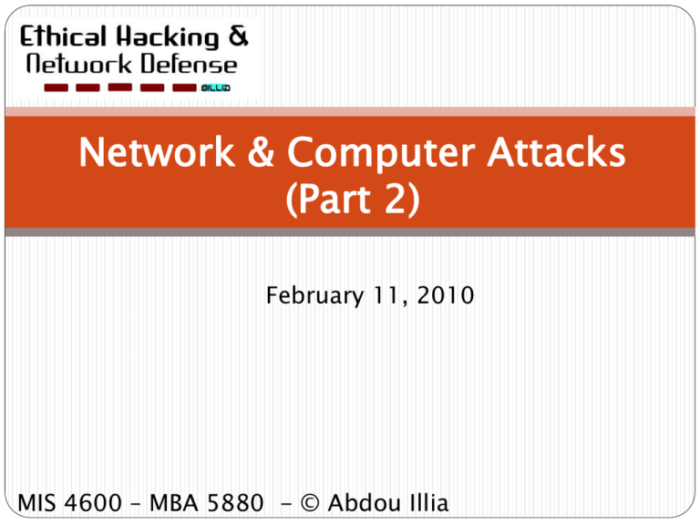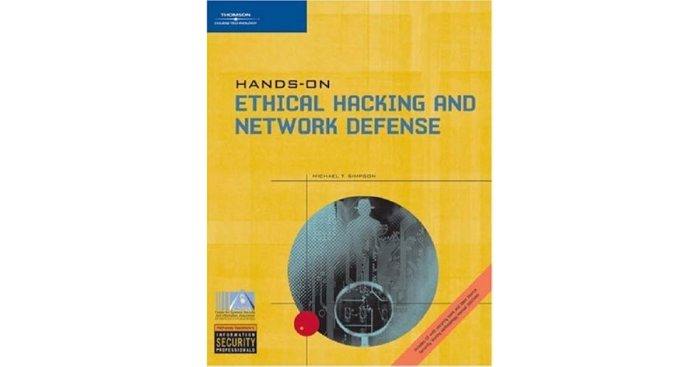Hands on ethical hacking and network defense pdf delves into the captivating world of ethical hacking and network security, empowering you with practical knowledge and techniques. Through this comprehensive guide, you’ll embark on a journey to understand the principles, tools, and methodologies of ethical hacking while exploring the essential strategies for defending your networks against malicious attacks.
With hands-on exercises, case studies, and best practices, this guide equips you with the skills to navigate the ever-evolving landscape of cybersecurity. Join us as we explore the ethical implications, responsible disclosure, and the latest threats to ensure your networks remain secure and resilient.
Hands-On Ethical Hacking

Ethical hacking involves utilizing the same techniques and tools as malicious hackers, but with the intent of identifying vulnerabilities and improving security. Ethical hackers adhere to strict ethical guidelines, ensuring responsible disclosure of vulnerabilities to organizations and avoiding any illegal activities.
Ethical hacking tools, such as vulnerability scanners and penetration testing frameworks, enable ethical hackers to simulate real-world attacks and assess the effectiveness of security measures. By understanding the tactics and techniques used by malicious actors, ethical hackers can proactively identify and mitigate potential threats.
Importance of Responsible Disclosure
Responsible disclosure is a crucial aspect of ethical hacking. Ethical hackers are obligated to report any discovered vulnerabilities to the affected organization in a timely and responsible manner. This allows organizations to patch vulnerabilities and mitigate potential risks before they can be exploited by malicious actors.
Network Defense
Network defense involves implementing security measures to protect networks from unauthorized access, data breaches, and other malicious activities. Effective network defense strategies include:
- Implementing firewalls to block unauthorized access to networks
- Deploying intrusion detection and prevention systems (IDS/IPS) to monitor network traffic for suspicious activities
- Using encryption to protect data in transit and at rest
- Enforcing strong password policies and implementing multi-factor authentication
- Educating users about cybersecurity best practices and raising awareness about potential threats
Role of IDS/IPS in Network Defense, Hands on ethical hacking and network defense pdf
Intrusion detection and prevention systems (IDS/IPS) play a critical role in network defense. IDS/IPS monitor network traffic for suspicious activities, such as unauthorized access attempts, malware infections, and data breaches. IDS/IPS can be configured to detect and alert administrators to potential threats, or to automatically block malicious traffic.
Case Studies and Best Practices

Case studies provide valuable insights into the practical application of ethical hacking and network defense techniques. By examining successful operations, organizations can learn from the experiences of others and identify best practices for improving their own security posture.
- Case Study: Ethical Hacking Uncovers Critical Vulnerability in Banking System– An ethical hacker discovered a vulnerability in a banking system that could have allowed attackers to steal millions of dollars. The vulnerability was responsibly disclosed to the bank, which patched the vulnerability and prevented a potential financial disaster.
- Best Practice: Implement a Vulnerability Management Program– A vulnerability management program helps organizations identify, prioritize, and patch vulnerabilities in a timely and efficient manner. By proactively addressing vulnerabilities, organizations can reduce the risk of successful cyberattacks.
Ethical Considerations

Ethical considerations are paramount in ethical hacking and network defense. Ethical hackers must adhere to strict ethical guidelines to ensure that their actions are not harmful or illegal. This includes respecting privacy, protecting data, and avoiding any activities that could compromise the security or reputation of organizations.
Ethical hackers must also be aware of the potential legal implications of their actions. Unauthorized access to computer systems or networks without proper authorization can be considered a crime in many jurisdictions.
Hands-On Practice
Hands-on practice is essential for developing proficiency in ethical hacking and network defense. Exercises and simulations provide a safe and controlled environment for participants to apply ethical hacking techniques and implement network defense strategies.
Hands-on practice can include:
- Simulating real-world attacks using ethical hacking tools
- Setting up and configuring IDS/IPS systems
- Conducting penetration testing to identify vulnerabilities in networks and systems
- Evaluating the effectiveness of ethical hacking and network defense measures
FAQ Summary: Hands On Ethical Hacking And Network Defense Pdf
What is the importance of ethical hacking?
Ethical hacking helps organizations identify and address vulnerabilities in their systems before malicious actors can exploit them, enhancing overall security posture.
How does network defense differ from ethical hacking?
While ethical hacking involves actively probing systems for vulnerabilities, network defense focuses on implementing measures to protect networks from unauthorized access and attacks.
What are the ethical considerations in ethical hacking and network defense?
Ethical hackers must adhere to strict guidelines, including respecting privacy, obtaining proper authorization, and avoiding actions that could harm systems or data.